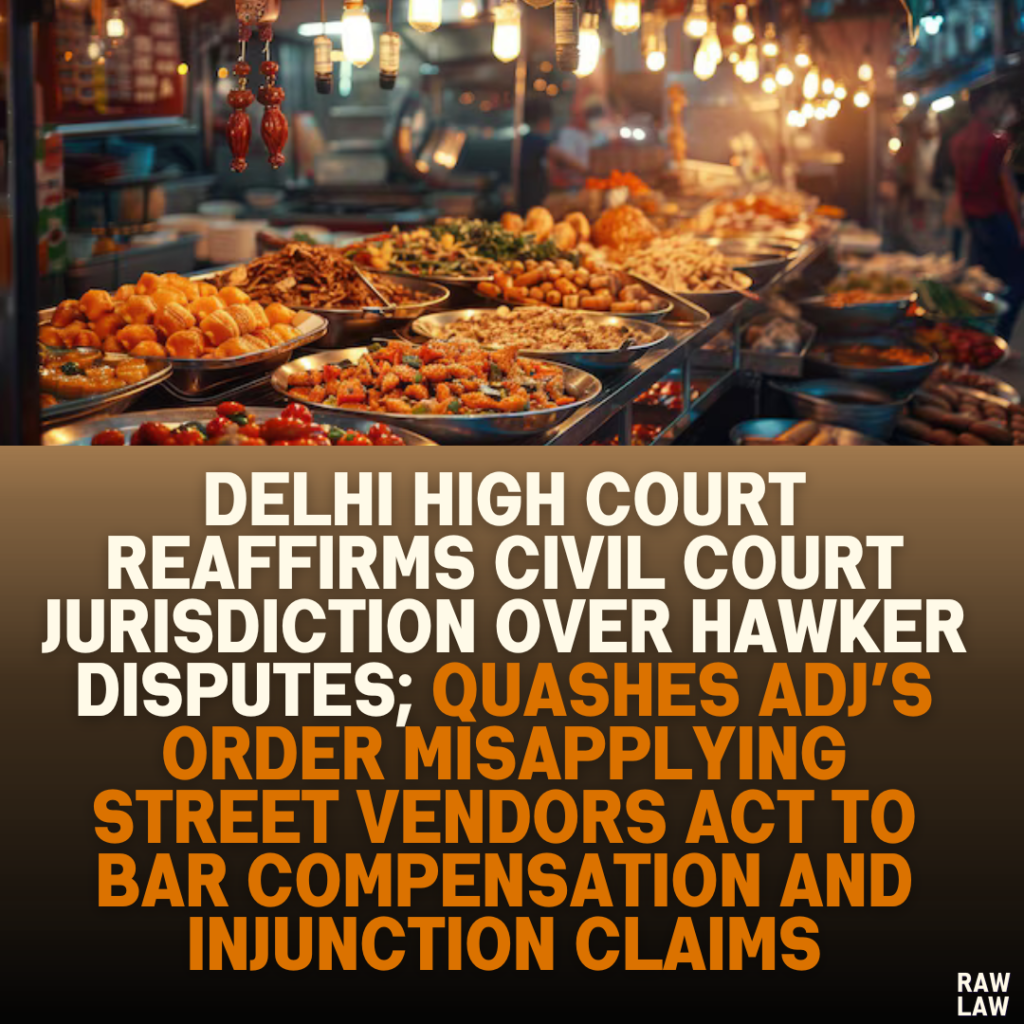Court’s Decision
The Delhi High Court ruled that civil courts retain jurisdiction over disputes involving hawkers and street vendors unless explicitly barred by statute. It quashed the Additional District Judge’s (ADJ) order returning the plaint under Order VII Rule 10 CPC on the premise that the case fell outside the civil court’s jurisdiction due to the provisions of the Street Vendors (Protection of Livelihood and Regulation of Street Vending) Act, 2014. The court remanded the matter to the ADJ for adjudication on the merits.
Facts
- Parties Involved: The appellants, long-standing hawkers/street vendors, operated at a designated squatting zone in Delhi based on tehbazari licenses granted to them.
- Grievances:
- Despite eligibility under the Street Vendors Act and listed in the zoning records, the appellants faced consistent harassment from municipal authorities and police.
- Their vending sites and structures were demolished by the municipal authorities on May 2, 2018, allegedly without following due process.
- Legal Reliefs Sought:
- Restoration of Structures: A mandatory injunction to rebuild vending structures and reinstall equipment.
- Compensation: Rs. 15,00,000 as damages for loss of livelihood and property.
- Permanent Injunction: To prevent further interference by the municipal corporation.
- Proceedings Before ADJ: The ADJ returned the plaint, invoking Order VII Rule 10 CPC, directing the appellants to approach the statutory mechanisms under the Street Vendors Act or file a writ petition in the High Court.
Issues
- Does the Street Vendors Act, 2014 bar the jurisdiction of civil courts for disputes involving hawkers and street vendors?
- Was the ADJ justified in returning the plaint under Order VII Rule 10 CPC?
Petitioner’s Arguments
- The Street Vendors Act does not expressly or impliedly bar civil courts’ jurisdiction.
- Section 9 CPC allows civil courts to hear all suits of civil nature unless specifically barred.
- The ADJ’s reliance on a jurisdictional bar was erroneous, as the reliefs sought (compensation and injunction) fell squarely within the scope of civil courts.
Respondent’s Arguments
- The Street Vendors Act provides a comprehensive redressal mechanism under Section 20.
- The appellants should have pursued remedies through the grievance committees constituted under the Act or filed a writ petition in the High Court.
Analysis of the Law
- Section 9 CPC: Civil courts have jurisdiction over all suits of a civil nature unless expressly or impliedly barred.
- Street Vendors Act, 2014:
- Section 20 establishes a mechanism for grievance redressal, including the formation of committees to resolve disputes.
- However, the Act does not explicitly exclude civil court jurisdiction.
- Precedent:
- Gainda Ram v. MCD (1993): Held that municipal actions against street vendors must follow due process but did not bar civil court suits.
- Venkamamidi Venkata Subba Rao (1997): Exclusion of civil court jurisdiction occurs only when a statute provides an exhaustive alternative remedy.
The court observed that statutory mechanisms under the Street Vendors Act address specific disputes but do not encompass broader civil claims, such as damages or injunctions, which remain within civil court jurisdiction.
Precedent Analysis
- Gainda Ram v. MCD: The Supreme Court emphasized procedural protections for street vendors but allowed legal recourse if municipal actions violated these safeguards.
- Venkamamidi Venkata Subba Rao v. Chatlapalli Seetharamaratna Ranganayakamma: Affirmed that civil court jurisdiction is impliedly barred only if the statute creates new rights, extinguishes old ones, and provides a conclusive mechanism for redress.
Court’s Reasoning
- Jurisdiction of Civil Courts:
- The ADJ incorrectly assumed that Section 20 of the Street Vendors Act ousted civil court jurisdiction.
- The Act does not bar civil suits seeking compensation or injunctions for rights violations.
- Relief Sought:
- Restoration of structures may involve issues under the Act.
- However, compensation and permanent injunctions fall within the domain of civil courts.
- Misuse of Order VII Rule 10 CPC:
- The ADJ’s direction to invoke writ jurisdiction in the High Court was misplaced, as writ jurisdiction is distinct from civil remedies under CPC.
Conclusion
The High Court allowed the appeal, set aside the ADJ’s order, and remanded the matter for adjudication on the merits. It clarified:
“There is no specific provision under the Street Vendors Act exclusively barring the jurisdiction of civil courts. When a legal right is infringed, a suit would lie unless specifically barred.”
Implications
- The judgment reaffirms that civil courts retain jurisdiction unless a statute explicitly bars it.
- It underscores the distinction between statutory grievance mechanisms and broader civil remedies.
- This ruling provides clarity on the interplay between special statutes like the Street Vendors Act and the CPC.
